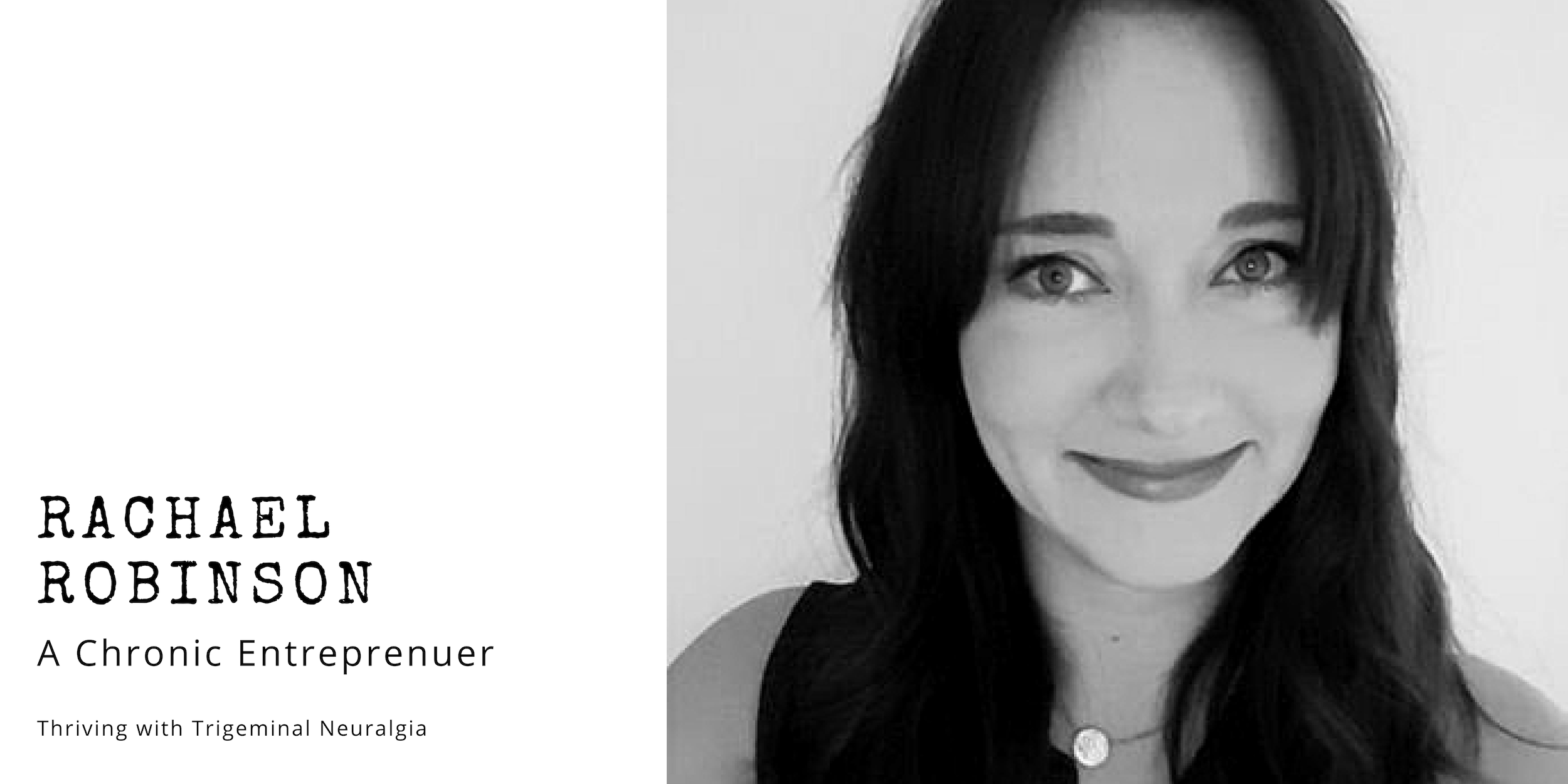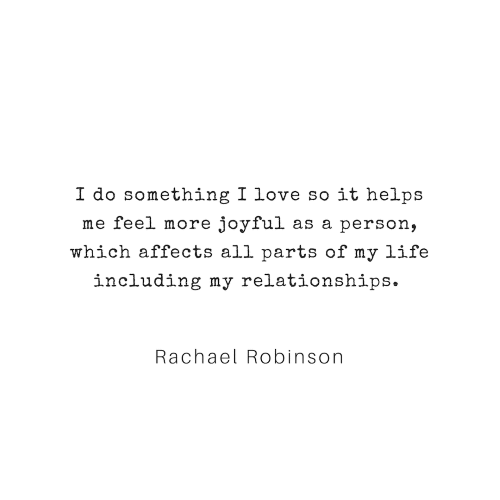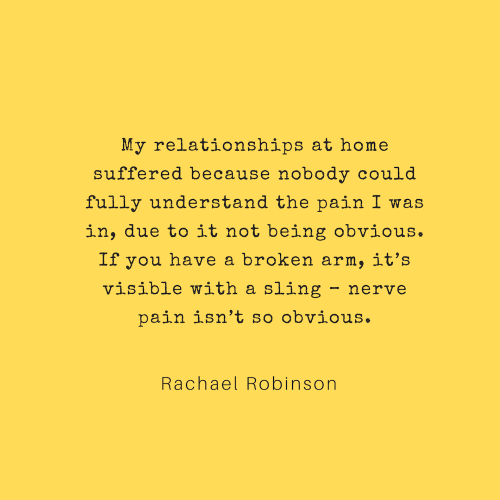A Chronic Entrepreneur: Rachael Robinson
When Rachael Robinson was twenty years old she was diagnosed with her chronic condition, Trigeminal neuralgia. The condition affects the trigeminal nerve, which carries sensations and feelings from your face to your brain. This means the condition can trigger excruciating pain along the face from small actions such as brushing your teeth or even talking. Rachael has lived with the condition for eleven years and now works full-time as a web developer, while running her small business which combines her love of craft and weddings at Ahoy Designs UK.
What’s your Chronic?
Trigeminal neuralgia. It’s a condition that affects the trigeminal nerve in the head.
Where/when were you diagnosed?
I was diagnosed when I was 20 years old, in the winter of 2008. I was cleaning the bathroom when suddenly the pain struck. I was lucky in that I was diagnosed during my first trip to my local GP. Many people aren’t, and as the pain can be in the mouth, people can have teeth pulled out thinking that’ll cure the pain.
What does being an entrepreneur mean to you?
It means everything to me. It gives me a sense of relief, away from thinking about the pain I’m in. I do something I love so it helps me feel more joyful as a person, which affects all parts of my life including my relationships. Creating something a customer will use on their wedding day is the best feeling ever and one which motivates me to make every effort to make each item I make perfect.
What came first, the chronic or the entrepreneurism?
Entrepreneurism. I’d say I’ve always pushed myself to be better by learning more. During my time at school, I worked a few jobs. I got to know and understand the ways different types of businesses worked. I got to know how to talk to colleagues and customers on different levels, to get the most out of conversations.
How did this path come to you?
I realised I wanted to do web development, so in my spare time I learned web development at my local college. I got a full-time job in a building society and continued learning web development in my spare time. A ‘web’ job came up in the company, so I applied and was successful. My bosses told me that I got the job over more experienced candidates because of the amount of effort I put into my interview and task preparation.
Did you go through any sort of 12-stages of grief with the diagnosis or take it in its stride? How did the process manifest itself? Did you immediately reassess your life?
The pain affected every waking moment of my life. I changed medications around the time I got my first web job, and unfortunately the side effects made me have to take a month off sick – three months after starting. Luckily, management were amazing and extremely supportive so I was able to go back part-time and increased back up to full-time when I was ready. My relationships at home suffered because nobody could fully understand the pain I was in, due to it not being obvious. If you have a broken arm, it’s visible with a sling – nerve pain isn’t so obvious. I put on weight due to not being able to run or exercise because it set the nerve pain off. I had terrible ache from the medication. I couldn’t go out for lunch with friends because eating set the nerve pain off. I couldn’t talk without it being painful, so I had to ask my work colleagues to email me if they had a question. I tried to take it one day at a time. I had good days and bad days. The only grief I remember going through (pre-op) was getting home from a run in tears because I had to stop halfway through my usual route because of the pain.
Did you seek out or join organisations representing your chronic for support or did you find comfort and answers elsewhere? What would you recommend in hindsight?
I started contributing to Facebook groups, and the UK’s Trigeminal Neuralgia association. I helped the association by responding to people who emailed in, asking for help. I also gave advice and support with their website. I’m still in touch with Facebook groups and post in several; I’m also an admin to one so responsible for making sure members are supported and are given sound advice.
How have you changed, if at all, in your relationships, decisions and values?
Yes. My mum says when I had brain surgery, they took out my patience! I have very little patience with people and less sympathy when people are ill. When I was ill, nobody ever knew about it and even now I never voice it to my husband when I’m feeling in pain (he can generally pick up on it). I don’t voice it because I don’t see much point because nobody can help. I’d rather not make it a big deal. I have less time for self-centred people and I put my time and energy into people who I feel are worth my time. Before I held friendships with people who I knew wouldn’t be there for me in time of need; I don’t now.
What is your life philosophy and has this changed?
I treat people with loyalty, honesty and how I’d like to be treated. I put my time and energy into things with meaning. I stay off social media as much as possible (which is hard considering I need to post often). I watch little TV as I’m generally always with my friends, family or putting time into improving my website or sorting customer orders.
What do you wish you’d known before?
Not to be bothered with what people think. Not everybody will like you; you won’t always get on with everybody but that’s okay. Be pleasant and treat people with respect and you’ll always get on, on some level, even if your values are different.
Are you on any treatments? Why/why not?
I had brain surgery when I was 22. I stayed off work for a few months whilst I recovered, then went back part-time. I had no pain for a year but ever since, I’ve had a few weeks of pain here and there. The pain isn’t as bad as what it used to be; therefore I don’t feel I need to go back on the medication.
What advice do you have for others starting out on this journey?
Don’t rush and take your time. If you don’t, you won’t enjoy it anymore and it won’t be a hobby or business you love – rather a chore. Results are slow but stay consistent. Find who your target audience is, and where to find them.
What is a ‘bad day’ for you?
A bad day is when I have a lot of nerve pain. It hinders everything – eating, talking – and puts a big black cloud over everything.
What do you do on a ‘bad day’?
I keep busy and try to stay out of situations where the pain could be set off. I pop my headphones in and bash out work. Time goes fast when you’re concentrating so I tend to be very productive on days when my pain is worse. To help me feel better, I buy my favourite coffee on my lunch break or buy some nice food. Small things help, even if it’s painful to consume.
How do you deal with stress?
I don’t deal with stress well. I cope even worse when my pain is bad. I feel I’ve only got a certain amount of ‘coping liquid’ in a bucket and the pain takes up about half, so I only have half left to use to deal with life. I try to remember that I can only do what I can do – therefore do what I can to the best of my ability.
What do you struggle with the most?
I find coping and interacting with people hard. I get very frustrated and angry when people are happy talking about themselves but unwilling to listen to others. When someone asks you how your weekend was just so they can talk about theirs – that’s my number one pet hate on a Monday morning!
What are you most proud of?
Building my business from scratch whilst having a full-time job and making a lot of customers happy along the way.
Best bits of being a Chronic Entrepreneur?
I’ve learned I’m strong mentally and able to cope with a lot. Even if I’m in pain, I crack on with life and try to not let it affect me.
Worst bits of being a Chronic Entrepreneur?
I feel I miss out on conversations, which could potentially be beneficial to my career and me. If the nerve pain is bad one day, I’m quieter and I put off conversations I need to have.
Are you a 5-year planner or are you winging it?
I’m not a 5-year planner. I have no idea where I’ll be in five years! I know what I’m like though and I know I’ll be doing something I love and that’s making a difference. I have goals but they are smaller, more manageable ones. I work better that way.
Dream weekend plans and have these changed?
I really love the simple things and spending the weekend with my friends, family and dogs are my favourite. My favourite weekends start with a trip to the gym with my husband. We then call on the way home for a coffee in my favourite local coffee shop. We get home, make breakfast and take the dogs out for a walk. We do all this by 10am, so we’ve got the whole day ahead together.
Ultimate dinner party guests?
Johnny Cash – I love him and his music. He’s the coolest person to have ever lived.
Kate Beckinsale – she’s hilarious and would be the entertainment.
Eddie Izzard – I’d ask him to repeat some of his act from Definite Article. I watch it at least once a year – it’s the funniest thing I’ve ever seen.
Mr Bean – I know he’s not real but he’d be really entertaining!
Chris Kamara – the sports presenter is absolutely hilarious
What advice would you give your younger self?
Not to spend time worrying over what people think. They are the ones who’ll be following you and seeing what you’re up to one day, so take risks and don’t look back.
What’s next?
I’m really in a good place right now. The balance between my full-time job and my small business is perfect.
How can people find you?
Twitter – rach_jenn
Instagram – Rachael_ahoydesigns | rachjenn
Let us know what you think below and share your story with us on Instagram tagging @achronicentrepreneur and using the hashtag #achronicentrepreneur.

























